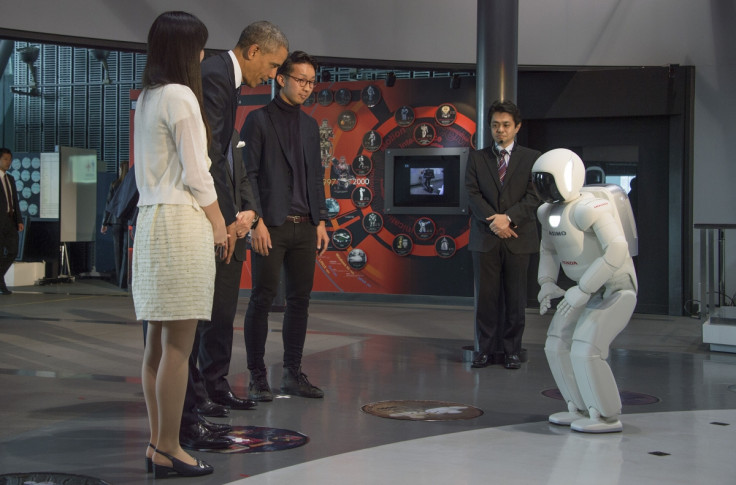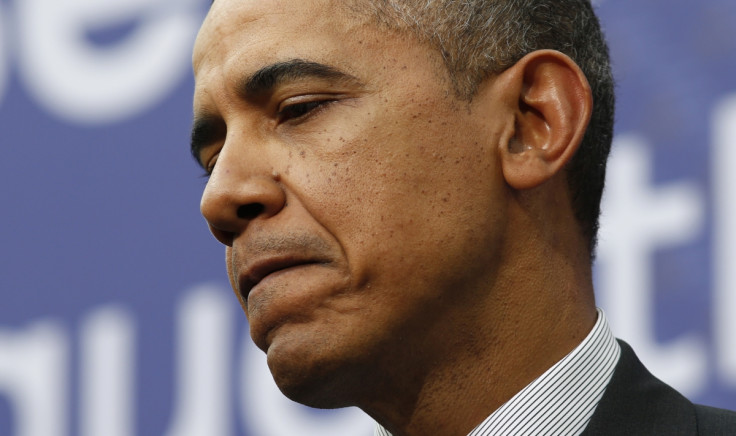How Bad is Barack Obama's Foreign Policy? Two Words: Joe Biden

How bad is President Obama's foreign policy? So bad he sent Vice President Joe Biden to Kiev to handle the Russia-Ukraine mess.
Yes, Barack "Red Line" Obama dispatched the bumbling Biden, the foreign policy "expert" who once called for Iraq to be partitioned by ethnicity into three countries and, as a senator, opposed President Ronald Reagan's military build-up that ended the Cold War.
Uncle Joe didn't disappoint, saying in Kiev: "Thank you for making me feel relevant again." He, of course, left empty-handed, and perhaps, again, feels irrelevant.
How bad is Obama's foreign policy? He's made Russian President Vladimir Putin look like a bleeding heart humanitarian -- stepping in to save the day in Syria by agreeing to accept its chemical weapons, then lecturing the US President on everything from covert surveillance to international law.
Obama, 52, a former community organizer from Chicago who likes bike rides and golf, has been over his head from the beginning with Putin, 61, a former KGB spook who likes judo and snarling dogs. Putin has played him like a fiddle, most recently when he took a phone call from US whistleblower Edward Snowden during a televised press appearance.
"We have strict legal regulation of the use of special services of special funds, including wiretaps and surveillance on the Internet," Putin told Snowden. "So massive, indiscriminate surveillance, in accordance with the law, cannot happen."
Meanwhile, Obama, battling critics at home over a massive surveillance programme that few Americans knew about, has been completely unsure what to do with Russia's incursion into Ukraine.
He has talked tough: just last week he said "they're not interested in any kind of military confrontation with us, understanding that our conventional forces are significantly superior to the Russians."
Not exactly diplomatic talk, and certainly not the way to deal with Putin. Obama lacks the nuance necessary to handle dicey international dilemmas, instead drawing "red lines" that box him into places from which he can't escape.
Like Syria. "We have been very clear to the Assad regime ... that a red line for us is we start seeing a whole bunch of chemical weapons moving around or being utilised," Obama said in August 2012. "That would change my calculus. That would change my equation."
Then Syrian President Bashar al-Assad red-lined all over the place. What did Obama say? "I didn't set a red line. The world set a red line." Mockery ensued, even from allies.

Worse than Jimmy Carter
Most recently, Sen. John McCain, who lost to Obama in the 2008 presidential race, said the very worst thing anyone can ever say about a president: He's worse than Jimmy Carter.
"I was not a great fan of my fellow Naval Academy graduate, Jimmy Carter. But after the invasion of Afghanistan by Russia, Jimmy Carter -- if I may use the words -- got religion and got tough," said the former POW and war hero.
McCain said the United States "lost its credibility" when Obama decided to ignore his own red line in Syria and let Russia step in.
"The United States has to lead. And if the United States doesn't lead, there's a vacuum and bad people lead. This exactly has been the result," the Arizona Republican said.
Obama's weak foreign policy isn't isolated to Russia. Blunders across Africa, most notably in Libya and Egypt, have made a new generation of American enemies, in part because Obama stepped in for a moment, and then disappeared, leaving chaos behind.
We lost credibility over Syria
Saudi Arabia, Turkey and especially Germany are miffed with the United States, and parts of Asia, notably South Korea, Vietnam, Indonesia and the Philippines, are reassessing their westward-leaning stances and renewing relationships with China.
Even Japan is wary (and it's worth noting that Obama has just kicked off a lengthy trip to the East, with stops in Tokyo, South Korea, Malaysia and the Philippines).
As for the Middle East, there's been almost no movement. Obama demanded a full freeze on Israeli settlement activity in the occupied territories as a prime condition for talks, and when that didn't happen, he simply threw up his hands.
In a first, the president has angered all sides, mainly because his terms of negotiation change constantly and his penchant for over-promising has left nearly everyone underwhelmed with what he has delivered.
A lot like how Americans feel about Obama's domestic policy.
Yet the president appears ready to simply phone it in for the next three years. The top photo in US media this week from his stop in Tokyo showed him bowing -- to a robot. And in his most notable quote, he said simply this: "That's some good sushi right there."
Joseph Curl is one of America's most forthright political writers, most notably as senior White House correspondent for the Washington Times. He is currently editor of the Drudge Report, arguably the world's most influential news aggregator.
You can read the Drudge Report by clicking here, and find out more about Joseph and his views on Twitter @JosephCurl.
© Copyright IBTimes 2025. All rights reserved.






















